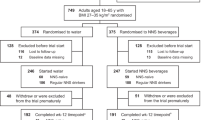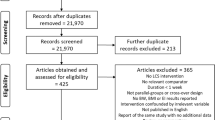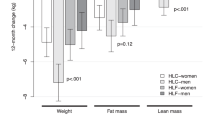Abstract
Objective:
The purpose of this study was to compare the dietary strategies, and use of fat- and sugar-modified foods and beverages in a weight loss maintainer group (WLM) and an always-normal weight group (NW).
Subjects:
WLM (N=172) had maintained ⩾10% weight loss for 11.5 years, and had a body mass index (BMI) of 22.0 kg m−2. NW (N=131) had a BMI of 21.3 kg m−2 and no history of being overweight. Three, 24-h recalls on random, non-consecutive days were used to assess dietary intake.
Results:
WLM reported consuming a diet that was lower in fat (28.7 vs 32.6%, P<0.0001) and used more fat-modification strategies than NW. WLM also consumed a significantly greater percentage of modified dairy (60 vs 49%; P=0.002) and modified dressings and sauces (55 vs 44%; P=0.006) than NW. WLM reported consuming three times more daily servings of artificially sweetened soft drinks (0.91 vs 0.37; P=0.003), significantly fewer daily servings of sugar-sweetened soft drinks (0.07 vs 0.16; P=0.03) and more daily servings of water (4.72 vs 3.48; P=0.002) than NW.
Conclusions:
These findings suggest that WLM use more dietary strategies to accomplish their weight loss maintenance, including greater restriction on fat intake, use of fat- and sugar-modified foods, reduced consumption of sugar-sweetened beverages and increased consumption of artificially sweetened beverages. Ways to promote the use of fat-modified foods and artificial sweeteners merits further research in both prevention- and treatment-controlled trials.
This is a preview of subscription content, access via your institution
Access options
Subscribe to this journal
Receive 12 print issues and online access
$259.00 per year
only $21.58 per issue
Buy this article
- Purchase on Springer Link
- Instant access to full article PDF
Prices may be subject to local taxes which are calculated during checkout
Similar content being viewed by others
References
Kristal AR, White E, Shattuck AL, Curry S, Anderson GL, Fowler A et al. Long-term maintenance of a low-fat diet: durability of fat-related dietary habits in the Women's Health Trial. J Am Diet Assoc 1992; 92: 553–559.
Kennedy E, Bowman S . Assessment of the effect of fat-modified foods on diet quality in adults, 19 to 50 years, using data from the Continuing Survey of Food Intake by Individuals. J Am Diet Assoc 2001; 101: 455–460.
Weststrate JA, van het Hof KH, van den Berg H, Velthuis-te-Wierik EJ, de Graaf C, Zimmermanns NJ et al. A comparison of the effect of free access to reduced fat products or their full fat equivalents on food intake, body weight, blood lipids and fat-soluble antioxidants levels and haemostasis variables. Eur J Clin Nutr 1998; 52: 389–395.
Westerterp KR, Verboeket-van de Venne WPHG, Westerterp-Plantenga MS, Velthuis-te Wierik EJM, de Graaf C, Weststrate JA . Dietary fat and body fat: an intervention study. Int J Obes 1996; 20: 1022–1026.
Gatenby SJ, Aaron JI, Morton GM, Mela DJ . Nutritional implications of reduced-fat food use by free-living consumers. Appetite 1995; 25: 241–252.
Howard BV, Manson JE, Stefanick ML, Beresford SA, Frank G, Jones B et al. Low-fat dietary pattern and weight change over 7 years: the Women's Health Initiative Dietary Modification Trial. JAMA 2006; 295: 39–49.
Gatenby SJ, Aaron JI, Jack VA, Mela DJ . Extended use of foods modified in fat and sugar content: nutritional implications in a free-living female population. Am J Clin Nutr 1997; 65: 1867–1873.
NHLBI. Clinical guidelines on the identification, evaluation, and treatment of overweight and obesity in adults: The evidence report. Obes Res 1998; 6: 51S–210S.
Drewnowski A . Intense sweeteners and energy density of foods: implications for weight control. Eur J Clin Nutr 1999; 53: 757–763.
Blundell JE, Hill AJ . Paradoxical effects of an intense sweetener (aspartame) on appetite. Lancet 1986; 1: 1092–1093.
Rogers PJ, Blundell JE . Separating the actions of sweetness and calories: effects of saccharin and carbohydrates on hunger and food intake in human subjects. Physiol Behav 1989; 45: 1093–1099.
Tordoff MG, Alleva AM . Oral stimulation with aspartame increases hunger. Physiol Behav 1990; 47: 555–559.
Canty DJ, Chan MM . Effects of consumption of caloric vs noncaloric sweet drinks on indices of hunger and food consumption in normal adults. Am J Clin Nutr 1991; 53: 1159–1164.
Rolls BJ, Laster LJ, Summerfelt A . Hunger and food intake following consumption of low-calorie foods. Appetite 1989; 13: 115–127.
Rolls BJ, Kim S, Fedoroff IC . Effects of drinks sweetened with sucrose or aspartame on hunger, thirst and food intake in men. Physiol Behav 1990; 48: 19–26.
Beridot-Therond ME, Arts I, Fantino M, De La Gueronniere V . Short-term effects of the flavour of drinks on ingestive behaviours in man. Appetite 1998; 31: 67–81.
Lavin JH, French SJ, Read NW . The effect of sucrose- and aspartame-sweetened drinks on energy intake, hunger and food choice of female, moderately restrained eaters. Int J Obes Relat Metab Disord 1997; 21: 37–42.
Fowler SP, Williams K, Resendez RG, Hunt KJ, Hazuda HP, Stern MP . Fueling the obesity epidemic? Artificially sweetened beverage use and long-term weight gain. Obesity (Silver Spring) 2008; 16: 1894–1900.
Colditz GA, Willett WC, Stampfer MJ, London SJ, Segal MR, Speizer FE . Patterns of weight change and their relation to diet in a cohort of healthy women. Am J Clin Nutr 1990; 51: 1100–1105.
Blackburn GL, Kanders BS, Lavin PT, Keller SD, Whatley J . The effect of aspartame as part of a multidisciplinary weight-control program on short- and long-term control of body weight. Am J Clin Nutr 1997; 65: 409–418.
Raben A, Vasilaras TH, Moller AC, Astrup A . Sucrose compared with artificial sweeteners: different effects on ad libitum food intake and body weight after 10 wk of supplementation in overweight subjects. Am J Clin Nutr 2002; 76: 721–729.
Tordoff MG, Alleva AM . Effect of drinking soda sweetened with aspartame or high-fructose corn syrup on food intake and body weight. Am J Clin Nutr 1990; 51: 963–969.
Porikos KP, Hesser MF, van Itallie TB . Caloric regulation in normal-weight men maintained on a palatable diet of conventional foods. Physiol Behav 1982; 29: 293–300.
de la Hunty A, Gibson S, Ashwell M . A review of the effectiveness of aspartame in helping with weight control. Br Nutr Found Nutr Bull 2006; 2006: 115–128.
Phelan S, Roberts M, Lang W, Wing RR . Empirical evaluation of physical activity recommendations for weight control in women. Med Sci Sports Exer 2007; 39: 1832–1836.
Stunkard AJ, Waxman M . Accuracy of self-reports of food intake: A review of the literature and a report of a small series. J Am Diet Assoc 1981; 79: 547–551.
Beer-Borst S, Amado R . Validation of a self-administered 24-h recall questionnaire used in a large-scale dietary survey. Z Ernahrungswiss 1995; 34: 183–189.
Eck LH, Klesges RC, Hanson CL, Slawson D, Portis L, Lavasque ME . Measuring short-term dietary intake: development and testing of a 1-week food frequency questionnaire. J Am Diet Assoc 1991; 91: 940–945.
Beaton GH . Approaches to analysis of dietary data: relationship between planned analyses and choice of methodology. Am J Clin Nutr 1994; 59 (1 Suppl): 253S–261S.
Kristal AR, Shattuck AL, Henry HJ . Patterns of dietary behaviors associated with selecting diets low in fat: reliability and validity a behavioral approach to dietary assessment. J Am Diet Assoc 1990; 90: 214–220.
Kristal AR, Shattuck AL, Patterson RE . Differences in fat-related dietary patterns between black, hispanic and white women: results from the Women's Health Trial Feasibility Study in Minority Populations. Pub Health Nutr 1999; 2: 253–262.
Stunkard AJ, Messick S (eds). Eating Inventory Manual. Psychological Corporation: New York, 1988.
Gorman BS, Allison DB . Measures of restrained eating. In: Allison DB (ed). Handbook of Assessment Methods for Eating Behaviors and Weight-Related Problems. Measures, Theory, and Research. Sage: Thousand Oaks, CA, 1995; 149–184.
Stunkard AJ, Messick S . The Three-Factor Eating Questionnaire to measure dietary restraint, disinhibition and hunger. J Psychosom Res 1985; 29: 71–83.
Speechly DP, Buffenstein R . Appetite dysfunction in obese males: evidence for role of hyperinsulinaemia in passive overconsumption with a high fat diet. Eur J Clin Nutr 2000; 54: 225–233.
Klem ML, Wing RR, McGuire MT, Seagle HM, Hill JO . A descriptive study of individuals successful at long-term maintenance of substantial weight loss. Am J Clin Nutr 1997; 66: 239–246.
Klem ML, Wing RR, McGuire MT, Seagle HM, Hill JO . Psychological symptoms in individuals successful at long-term maintenance of weight loss. Health Psychol 1998; 17: 336–345.
Storey ML, Forshee RA, Anderson PA . Beverage consumption in the US population. J Am Diet Assoc 2006; 106: 1992–2000.
Bellisle F, Drewnowski A . Intense sweeteners, energy intake and the control of body weight. Eur J Clin Nutr 2007; 61: 691–700.
Stookey JD, Constant F, Gardner CD, Popkin BM . Replacing sweetened caloric beverages with drinking water is associated with lower energy intake. Obesity (Silver Spring) 2007; 15: 3013–3022.
DiMeglio DP, Mattes RD . Liquid versus solid carbohydrate: effects on food intake and body weight. Int J Obes Relat Metab Disord 2000; 24: 794–800.
Sun SZ, Empie MW . Lack of findings for the association between obesity risk and usual sugar-sweetened beverage consumption in adults--a primary analysis of databases of CSFII-1989–1991, CSFII-1994–1998, NHANES III, and combined NHANES 1999–2002. Food Chem Toxicol 2007; 45: 1523–1536.
Nielsen SJ, Popkin BM . Changes in beverage intake between 1977 and 2001. Am J Prev Med 2004; 27: 205–210.
Malik VS, Schulze MB, Hu FB . Intake of sugar-sweetened beverages and weight gain: a systematic review. Am J Clin Nutr 2006; 84: 274–288.
Vartanian LR, Schwartz MB, Brownell KD . Effects of soft drink consumption on nutrition and health: a systematic review and meta-analysis. Am J Public Health 2007; 97: 667–675.
American Institute for Cancer Research., World Cancer Research Fund. Food, Nutrition, Physical Activity and the Prevention of Cancer: A Global Perspective: A Project of World Cancer Research Fund International. American Institute for Cancer Research: Washington, D.C., 2007.
Pereira MA . The possible role of sugar-sweetened beverages in obesity etiology: a review of the evidence. Int J Obes (Lond) 2006; 30 (Suppl. 3): S28–S36.
Bachman CM, Baranowski T, Nicklas TA . Is there an association between sweetened beverages and adiposity? Nutr Rev 2006; 64: 153–174.
Forshee RA, Anderson PA, Storey ML . Sugar-sweetened beverages and body mass index in children and adolescents: a meta-analysis. Am J Clin Nutr 2008; 87: 1662–1671.
Gibson S . Sugar-sweetened soft drinks and obesity: a systematic review of the evidence from observational studies and interventions. Nutr Res Rev 2008; 21: 134–147.
Maurer J, Taren DL, Teixeira PJ, Thomson CA, Lohman TG, Going SB et al. The psychosocial and behavioral characteristics related to energy misreporting. Nutr Rev 2006; 64 (2 Pt 1): 53–66.
Acknowledgements
This research was supported, in part, by National Institutes of Health grant DK066787 and by a grant from the American Beverage Corporation. A copy of the manuscript was provided to the American Beverage Corporation for internal review prior to manuscript submission; however, the Corporation was not involved in the study design, study conduct, data collection, analysis, or interpretation.
Author information
Authors and Affiliations
Corresponding author
Rights and permissions
About this article
Cite this article
Phelan, S., Lang, W., Jordan, D. et al. Use of artificial sweeteners and fat-modified foods in weight loss maintainers and always-normal weight individuals. Int J Obes 33, 1183–1190 (2009). https://doi.org/10.1038/ijo.2009.147
Received:
Revised:
Accepted:
Published:
Issue Date:
DOI: https://doi.org/10.1038/ijo.2009.147
Keywords
This article is cited by
-
Water intake and intra-meal fluid consumption in relation to general and abdominal obesity of Iranian adults
Nutrition Journal (2020)
-
Macronutrient Content of the Diet: What Do We Know About Energy Balance and Weight Maintenance?
Current Obesity Reports (2016)
-
Socio-demographic correlates and trends in low-calorie sweetener use among adults in the United States from 1999 to 2008
European Journal of Clinical Nutrition (2015)
-
Intense Sweeteners, Appetite for the Sweet Taste, and Relationship to Weight Management
Current Obesity Reports (2015)
-
Obesity as a Disease
Current Obesity Reports (2014)



